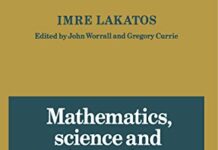
Ebook Info
- Published: 1980
- Number of pages: 256 pages
- Format: PDF
- File Size: 21.95 MB
- Authors: Imre Lakatos
Description
Imre Lakatos’ philosophical and scientific papers are published here in two volumes. Volume I brings together his very influential but scattered papers on the philosophy of the physical sciences, and includes one important unpublished essay on the effect of Newton’s scientific achievement. Volume II presents his work on the philosophy of mathematics (much of it unpublished), together with some critical essays on contemporary philosophers of science and some famous polemical writings on political and educational issues. Imre Lakatos had an influence out of all proportion to the length of his philosophical career. This collection exhibits and confirms the originality, range and the essential unity of his work. It demonstrates too the force and spirit he brought to every issue with which he engaged, from his most abstract mathematical work to his passionate ‘Letter to the director of the LSE’. Lakatos’ ideas are now the focus of widespread and increasing interest, and these volumes should make possible for the first time their study as a whole and their proper assessment.
User’s Reviews
Reviews from Amazon users which were colected at the time this book was published on the website:
⭐Imre Lakatos (1922-1974) was a Hungarian philosopher of mathematics and science; the companion volume to this book is
⭐.The Editor’s Introduction states, “When Imre Lakatos died in 1974, many friends and colleagues expressed the hope that his unpublished papers would be made available. Some were also interested in seeing his contributions to journals and conference proceedings collected together in a book… we have prepared two volumes of selected papers which we hope will meet these demands. None of the papers published here for the first time was regarded by Lakatos as entirely satisfactory… Volume 1 is a collection of Lakatos’s best known articles developing the methodology of scientific research programmes…”He rejects “dogmatic falsificationism” [e.g., Karl Popper]: “For the truth-value of the ‘observational’ propositions cannot be indubitably decided: no factual proposition can ever be proved from an experiment. Propositions can only be derived from other propositions, they cannot be derived from facts; one cannot prove statements from experiences… This is one of the basic points of elementary logic, but one which is understood by relatively few people even today.” (Pg. 15-16)He then explains “scientific/progressive” explanations: “If we put forward a theory to resolve a contradiction between a previous theory and a counterexample in such a way that the new theory, instead of offering a content-increasing (scientific) explanation, only offers a content-decreasing (linguistic) explanation, the contradiction is resolved in a merely semantical, unscientific way. A given fact is established scientifically only if a new fact is also explained with it. Sophisticated falsificationism thus shifts the problem of how to appraise theories to the problem of how to appraise series of theories. Not an isolated theory, but only a series of theories can be said to be scientific or unscientific: to apply the term ‘scientific’ to one single theory is a category mistake.” (Pg. 34)He observes, “It is very difficult to defeat a research programme supported by talented, imaginative scientists. Alternatively, stubborn defenders of the defeated programme may offer ad hoc explanations of the experiments or a shrewd ad hoc ‘reduction’ of the victorious programme to the defeated one. But such efforts we should reject as unscientific. Our considerations explain why crucial experiments are seen to be crucial only decades later.” (Pg. 72)He states, “The direction of science is determined primarily by human creative imagination and not by the universe of facts which surrounds us. Creative imagination is likely to find corroborating novel evidence even for the most ‘absurd’ programme, if the search has sufficient drive. This look-out for new confirming evidence is perfectly permissible. Scientists dream up phantasies and then pursue a highly selective hunt for new facts which fit these phantasies. This process may be described as ‘science creating its own universe’… A brilliant school of scholars (backed by a rich society to finance a few well-planned tests) might succeed in pushing any fantastic programme ahead, or, alternatively, if so inclined, in overthrowing any arbitrarily chosen pillar of ‘established knowledge.’” (Pg. 99-100)He argues, “The methodology of research programmes… must be supplemented by empirical-external history. No rationality theory will ever solve problems like why Mendelian genetics disappeared in Soviet Russia in the 1950s, or why certain schools of research into genetic racial differences or into the economics of foreign aid came into disrepute in the Anglo-Saxon countries in the 1960s. Moreover, to explain different speeds of development of different research programmes we may need to invoke external history. Rational reconstruction of science … cannot be comprehensive since human beings are not COMPLETELY rational animals; and even when they act rationally they may have a false theory of their own rational actions.” (Pg. 114)Though far less well-known than Popper or Thomas Kuhn, Lakatos was one of the most important philosophers of science of the 20th century, and his writings are “must reading” for anyone studying the philosophy of science.
⭐”Falsification and the Methodology of Scientific Research Programmes.” “A series of theories is theoretically progressive … if each new theory has some excess empirical content over its predecessor, that is, if it predicts some novel, hitherto unexpected fact. … [It] is also empirically progressive … if some of this excess empirical content is also corroborated, that is, if each new theory leads to the discovery of some new fact. Finally, let us call a problemshift progressive if it is both theoretically and empirically progressive, and degenerating if it is not.” (pp. 33-34). “Justificationists valued ‘confirming’ instances of a theory; naive falsificationists stressed the ‘refuting’ instances; for the methodological falsificationist [i.e. Lakatos] it is the—rather rare—corroborating instances of the excess information which are the crucial ones … We are no longer interested in the thousands of trivial verifying instances nor in the hundreds of readily available anomalies.” (p. 36). One implication is that it may be perfectly rational to work on a theory even if it rests on false assumptions. “Indeed, some of the most important research programmes in the history of science were grafted on to older programmes with which they were blatantly inconsistent.” (p. 56). In quantum mechanics, for example, “the decision to go ahead with temporarily inconsistent foundations was taken by Einstein in 1905, but even he wavered in 1913, when Bohr forged forward again” (p. 59). Similarly, “Cartesian push-mechanics” was “inconsistent with Newton’s theory of gravitation,” but “Newton worked both on his positive heuristic (successfully) and on a reductionist programme (unsuccessfully), and disapproved both of Cartesians who, like Huyghens, thought that it was not worth wasting time on an ‘unintelligible’ programme and of some of his rash disciples who, like Cotes, thought that the inconsistency presented no problem” (p. 59). Another consequence is that “The history of science has been and should be a history of competing research programmes …, but it has not been and must not become a succession of periods of normal science: the sooner competition starts, the better for progress. ‘Theoretical pluralism’ is better than ‘theoretical monism'” (p. 69).I think Lakatos makes too much of the Popper/Kuhn dichotomy. Lakatos points out again and again that he “followed, and tried to improve, Popperian tradition” (p. 95), and has copious quotations and precise footnotes pointing to Popper. By contrast, Kuhn’s theory is brusquely misrepresented without proper referencing; e.g. “there is no particular rational cause for the appearance of a Kuhnian ‘crisis’ … ‘Crisis’ is a psychological concept; it is a contagious panic” (p. 90), for which there is no reference other than an inconspicuous “Kuhn [1970]” elsewhere on the page. This is all the more unfortunate since “Popper never abandoned his earlier (naive) falsification rules. He has demanded, until this day, that ‘criteria of refutation have to be laid down beforehand: it must be agreed, which observable situations, if actually observed, mean that a theory is refuted'” (p. 94), which Lakatos has just demonstrated to be utter folly (e.g., pp. 17, 65ff.).”Why did Copernicus’s research programme supersede Ptolemy’s?” Ptolemy’s “research programme” was clearly degenerate. “Every single move in the geostatic programme ran counter to the Platonic heuristic” (p. 181), e.g. equants, and “it always lagged behind the facts” (p. 182). “Copernicus’s programme was certainly theoretically progressive. It anticipated novel facts never observed before” (p. 183), such as the phases of Venus. But none of these anticipated novel facts were corroborated until the phases of Venus were observed in 1616. “It seems then that the Copernican Revolution only became a fully fledged scientific revolution in 1616, when it was almost immediately abandoned for the new dynamics-oriented physics” (p. 184). Hardly very satisfying, but we are saved by “Elie Zahar’s modified methodology of scientific research programmes” (p. 185). “Zahar’s modification lies primarily in his new conception of ‘novel fact’. … Zahar’s claim is that several important facts concerning planetary motions are straightforward consequences of the original Copernican assumptions and that, although these facts were previously known, they lend much more support to Copernicus than to Ptolemy within whose system they were dealt with only in an ad hoc manner, by parameter adjustment. From the Copernican model … the following facts can be predicted prior to any observation: (i) Planets have stations and retrogressions. … (ii) The periods of the superior planets, as seen from the Earth are not constant. … (iv) The elongation of the inferior planets is bounded” (pp. 185-186). Furthermore, “the determination of planetary distances represents excess content of Copernicus’s theory over Ptolemy’s” (p. 187). “But it turned out that apart from his initial successes, Copernicus could save all the Ptolemaic phenomena only in an ad hoc and, in its dynamical aspects, very unsatisfactory, way. So Kepler and Galileo took off from the Commentariolus rather than from De revolutionibus. They took off from the point where the steam ran out of the Copernican programme.” (p. 188). Here Lakatos seems to forget that Copernicus determination of the planetary distances was necessary for Kepler’s cherished polyhedral theory.”History of science and its rational reconstructions.” A philosophy of science (or a “logic of scientific discovery”) “can be criticized by criticizing the rational reconstructions to which they lead” (p. 122). For example, “the internal history of inductivists consists of alleged discoveries of hard facts and of so-called inductive generalizations. The internal history of conventionalists consists of factual discoveries and of the erection of pigeon hole systems and their replacement by allegedly simpler ones. The internal history of falsificationists dramatizes bold conjectures … and, above all, triumphant ‘negative crucial experiments’. The methodology, finally, emphasizes long-extended theoretical and empirical rivalry of major research programmes [and] progressive and degenerating problemshifts.” (p. 118). History is the ultimate test for any philosophy of science in that “history may be seen as a ‘test’ of its rational reconstructions” (p. 123). “If a historian’s methodology provides a poor rational reconstruction, he may either misread history in such a way that it coincides with his rational reconstruction, or he will find that the history of science is highly irrational.” (p. 127).Lakatos apparently felt that the last article, on Newton, was “in need of substantial revision” (p. 193) and one can only agree. For one thing, Lakatos claims that “Newton turns the negation of his theory into its own foundation” (p. 210) just because the law of gravitation is derived from Kepler’s laws with which it is strictly speaking inconsistent. This is hardly a very balanced statement, especially not from someone who accuses Kuhn of feeding “the New Left” (p. 136).
⭐Não comprem este livro, pois não é compatível com o aparelho Kindle!!! Um golpe! Roubam seu dinheiro!O livro é incompatível com o próprio aparelho da Amazon!!!! Um absurdo
⭐
⭐Estudo
⭐
⭐Lakatos is always great.
Keywords
Free Download The Methodology of Scientific Research Programmes: Volume 1: Philosophical Papers (Philosophical Papers (Cambridge)) in PDF format
The Methodology of Scientific Research Programmes: Volume 1: Philosophical Papers (Philosophical Papers (Cambridge)) PDF Free Download
Download The Methodology of Scientific Research Programmes: Volume 1: Philosophical Papers (Philosophical Papers (Cambridge)) 1980 PDF Free
The Methodology of Scientific Research Programmes: Volume 1: Philosophical Papers (Philosophical Papers (Cambridge)) 1980 PDF Free Download
Download The Methodology of Scientific Research Programmes: Volume 1: Philosophical Papers (Philosophical Papers (Cambridge)) PDF
Free Download Ebook The Methodology of Scientific Research Programmes: Volume 1: Philosophical Papers (Philosophical Papers (Cambridge))



